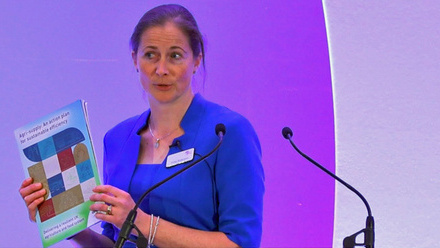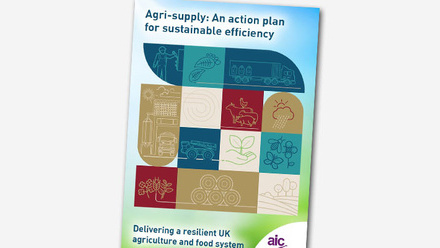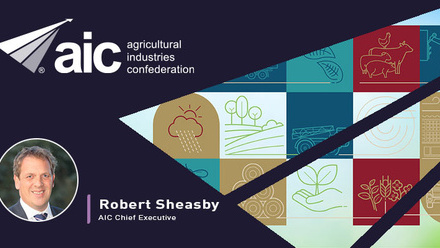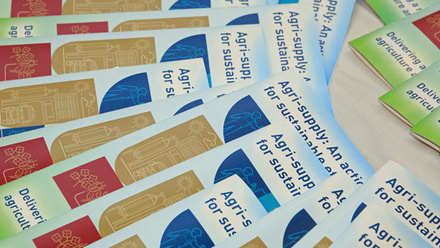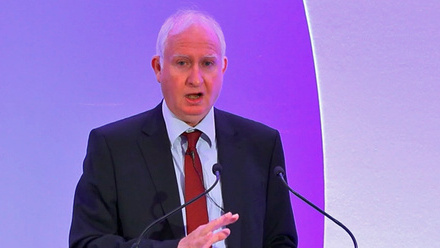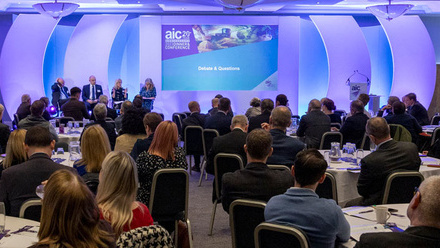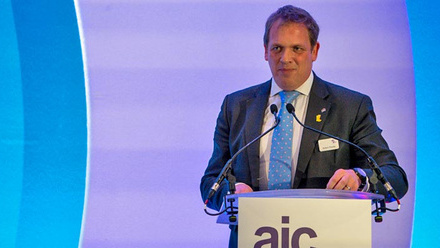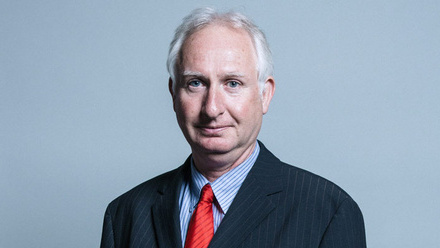AIC Conference 2024: Defra Minister reaches out to UK agriculture as speakers debate agri-food supply chain "added value"

- Food Security Minister acknowledges "anxiety" felt by the industry and invites further discussion on Inheritance Tax
- National Land Use Framework consultation "coming soon"
- Industry welcomes strategic AIC report "An action plan for sustainable efficiency"
- NFU President Tom Bradshaw says climate change is sector's number one challenge
- AIC strikes an optimistic tone for agriculture through innovation and smarter partnerships between industry and Government
- Images from AIC Conference available to view and download here
- Watch video playlist below for full AIC Conference 2024 coverage
Addressing the biggest-ever AIC Conference of over 200 delegates, AIC Chair Jonathan Lane remarked that capturing "added value" depends on where you sit in the food system.
This set the scene for a packed, passionate, and deeply insightful agri-food industry forum on this year's theme of "Capturing 'added value' within the agri-food supply chain".
View photos from the Conference on Flickr album below.

Minister of State for Food Security and Rural Affairs, Daniel Zeichner MP was quick to acknowledge the anxiety felt by the farmers and the wider agricultural industry concerning inheritance tax.
He said: "I stand firmly with the Chancellor on the decisions that she has made. We're not going to see any change because the budgets are set.
"This is an extremely complicated area of inheritance tax and business planning. Yes, it will require behaviour change in some cases, but it will be relatively few people who are affected."
Whilst standing firm with the principle announced in the Budget on Agricultural and Business Property Relief (APR/BPR), the Minister added that he wanted to better understand the concerns of the industry and find a way forward.
The Minister reiterated the Government's desire for a 10 to 20-year vision, allowing the industry to look ahead with certainty with this recently-elected Government and industry in partnership to establish a framework for stability and success.
The Government's mission, he stressed, was to "create conditions for investment and economic success."
Minister Zeichner trailed the announcement that a consultation on a National Land Use Framework was imminent. AIC Chief Executive Robert Sheasby welcomed the news, adding: "We have been calling for a strategic land use framework for many years, to encourage investment and create a more stable environment, I look forward to AIC lending its full expertise to making this a reality".
The Minister emphasised Defra's hard-won success in securing £5 billion of funding over the next two years, underpinning the Government's commitment to the industry. "I want to see more food produced in this country" he said, reflecting that food security has "shot up the agenda".
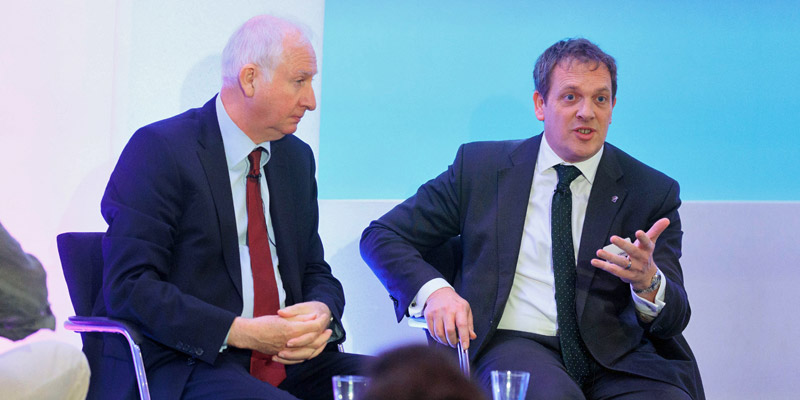
Mr Sheasby expressed concern that last month's Budget did little to boost confidence and encourage investment and growth but welcomed the government’s stated willingness to work in partnership with industry.
He struck an upbeat note that innovation, technology and smarter partnerships between Government and industry could deliver on trade and economic growth, the key was an openness to work together.
Sustainability Action Plan launched
AIC Conference also saw the launch of AIC's Sustainability Action Plan "Agri-supply: An action plan for sustainable efficiency – delivering a resilient UK agriculture and food system".
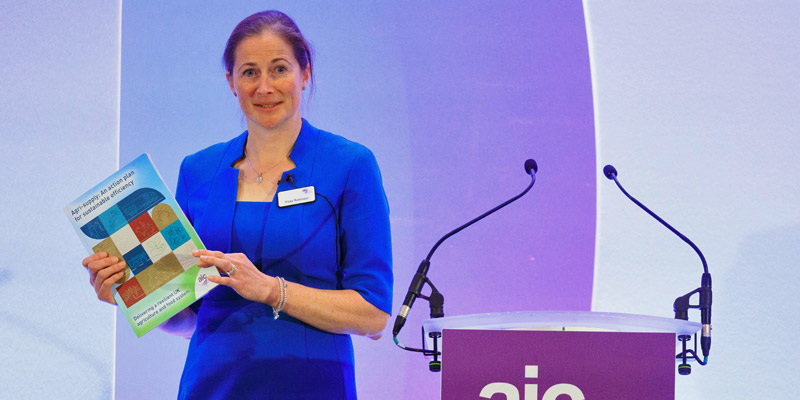
Vicky Robinson, AIC's Head of Sustainability, challenged Members of the trade association to consider their progress.
The report reflects a year-long gestation and brings together all the issues in one place, providing an important guide for actions based on evidence. Click below to find out more.
Confidence is critical
NFU President Tom Bradshaw delivered an impassioned plea to the Government to back up their warm words with actions.
"Confidence is absolutely central to the farming industry; it's a long-term business and we need confidence to invest," he told Conference delegates.
He said the industry feels "betrayed", with inheritance tax at the top of the list. Mr Bradshaw went on to name many issues where solutions need to be found – fair trade, not free trade, what is meant by food security, public sector procurement, and the planning system. Above all, he stated the biggest threat facing the industry was climate change.

Henry Dimbleby provided a fascinating update on the National Food Strategy, three years on from its publication. "The opportunity is huge, but the jeopardy is too," he said.
He summarised the transitional challenge dramatically: "Food delivers £12 trillion in value to global output, but does £13 trillion in damage". The challenge is to navigate the transition whilst maintaining balance and avoiding enormous fluctuations.
Mr Dimbleby emphasised the phenomenal capability of the food system when it is incentivised – the challenge is getting the incentives right. He welcomed the Government's stated land use framework and recognised the need for land to produce multiple outputs – food, fuel and fibre – and that there were trade-offs.
He called for policy to be scientific, backed up by evidence rather than politics or emotion as it needs to be future-proof. Collaborative discussion is more needed now than ever. "You can dance with a complex system, but you cannot control it" he warned.
Devolved nations view
George Burgess, Director of Agriculture and Rural Economy for the Scottish Government was also positive about the future, seeing "Scotland as a global leader in sustainable and regenerative agriculture with co-designed policy between industry and Government at the centre of our vision".
He acknowledged the transition required in food production towards a sustainable carbon carbon-neutral and biodiverse future and emphasised that there would be no cliff edges.
A policy based upon whole farm plans would begin in 2025 with full implementation in 2027, delivering on environmental commitments whilst enabling rural communities to thrive.
Huw Irranca Davies MS, Deputy First Minister and Cabinet Secretary for Climate Change and Rural Affairs was also keen to emphasise the Welsh Government's consultative and collaborative approach with industry to deliver the Sustainable Farming Scheme (SFS) which launches in 2026.
Robert Sheasby challenged the devolved governments on the need to align policies to facilitate improved trade. It was clear that the Scottish Government was focused on the EU, which influenced their approach to precision breeding technology - a subject that remains on Holyrood's "watching brief" pile.
Regen ag focus
Providing practical insights Paul Cherry of Groundswell Festival fame and Emma Loder-Symmonds of Nonington Farms in Kent provided strong evidence to suggest that regenerative agriculture was part of the transition.
They conceded this requires a mindset change and an acceptance of a much more complicated system than that of conventional farming.
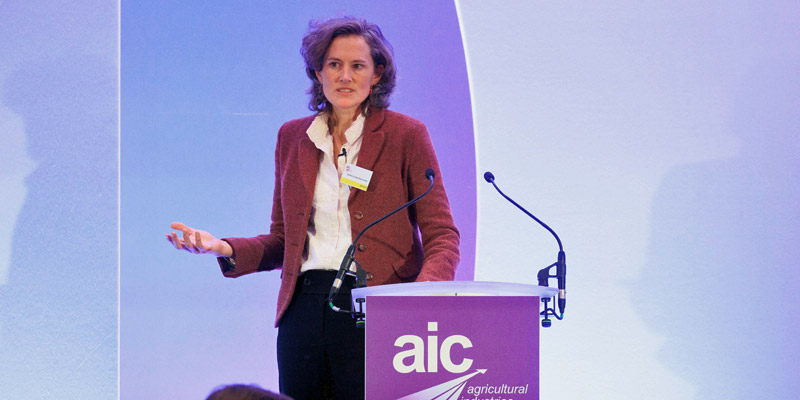
However, it reduces costs, can maintain yield and delivers for soil health, biodiversity and the environment. The pair agreed that it should be possible for the arable sector to be carbon neutral – a bold claim.
Finally, Phil Bicknell of the UK Agritech Centre and Professor Per Ola Kristensson of Cambridge University discussed how the agritech sector and artificial intelligence (AI) can drive change.
Providing a wealth of innovative facilities and expertise, the UK Agritech Centre accelerates the development and deployment of innovation across sectors.
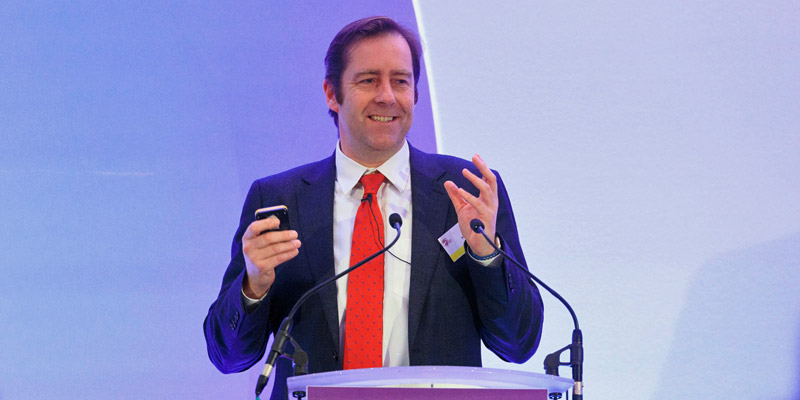
Defined into four categories – One Health, Sustainable Production, Resilient Food Systems, and Intelligent Agriculture - Mr Bicknell believes agritech can deliver phenomenal opportunities.
Currently, 92 projects are live delivering an estimated £70 million to the sector with projects such as Potato Lyte, R-Leaf and Dancing with Daffodils.
The revelation that AI will never be 100% accurate, was a surprise to many in the conference hall. But, practical applications in animal health and harvest technology showed how the technology can improve productivity.
All to play for and much to energise all involved in the UK agri-food industry.
The AIC Dinner & Conference 2024 was kindly supported by sponsors US Soybean Export Council (USSEC), Kiwa UK, Lantra, Eden Search, and Reels In Motion. The Royal Agricultural Benevolent Institution (RABI) was this year's charity partner.
ENDS
About AIC
As the UK agricultural supply industry's leading trade association, the Agricultural Industries Confederation (AIC) represents businesses in key sectors within the supply chains that feed the nation.
Its Member businesses supply UK farmers and growers with the animal feed, fertiliser, seed, crop protection products, trusted advice and quality services that are essential to producing food, as well as trading crops and commodities across the globe.
Formed in October 2003 by a merger of three trade associations, today AIC has over 230 Members in the agri-supply trade and represents £17.8 billion* turnover at farmgate.
AIC works on behalf of its Members by lobbying policymakers and stakeholders, delivering information, providing trade assurance schemes, and offering technical support.
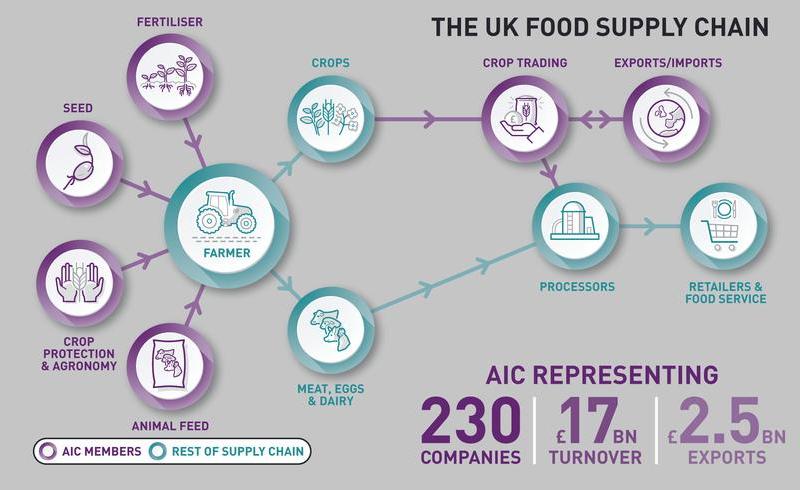
AIC Services manages a range of services, including Trade Assurance Schemes and professional registers recognised by the UK Government as essential means to underpin feed and food safety alongside fertiliser security.
These schemes and professional registers include:
- Trade Assurance Scheme for Combinable Crops (TASCC)
- Feed Materials Assurance Scheme (FEMAS)
- Universal Feed Assurance Scheme (UFAS)
- European Seed Treatment Assurance (ESTA)
- Fertiliser Industry Assurance Scheme (FIAS)
- Feed Adviser Register (FAR)
- Renewable Energy Directive (RED)
- Forage Assurance Scheme (FAA)
- AIC Services Palm Oil Credit Scheme (APOCS)
*According to a 2023 survey of AIC Members.
Press Contact
Oli Hill, Head of Communications, AIC
+44 (0)1733 385230
[email protected]


